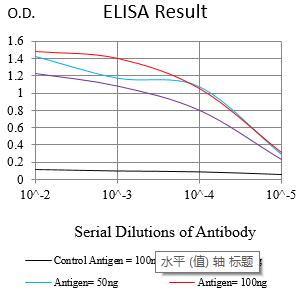

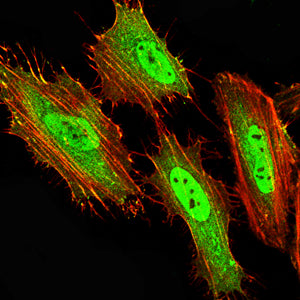
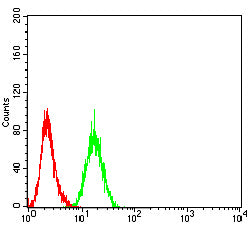
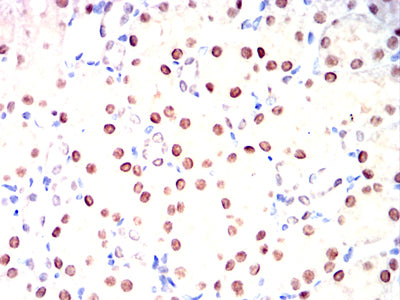
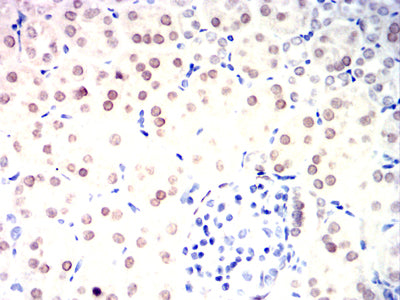
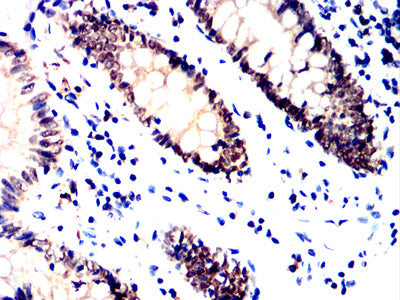
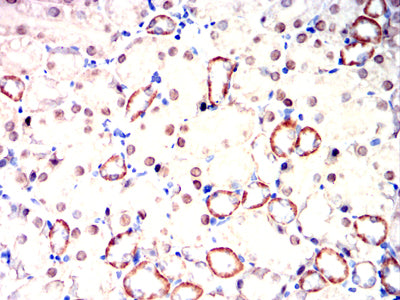
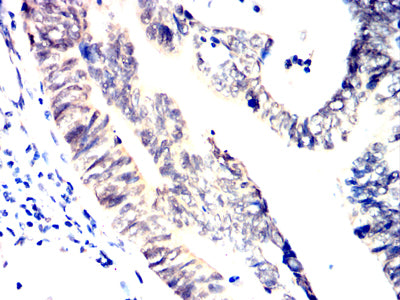
| WB | 1/500 - 1/2000 | Human,Mouse,Rat |
| IF | 咨询技术 | Human,Mouse,Rat |
| IHC | 1/200 - 1/1000 | Human,Mouse,Rat |
| ICC | 1/50 - 1/200 | Human,Mouse,Rat |
| FCM | 1/200 - 1/400 | Human,Mouse,Rat |
| Elisa | 1/10000 | Human,Mouse,Rat |
| Aliases | T2D; FJHN; HNF2; LFB3; RCAD; TCF2; HPC11; LF-B3; MODY5; TCF-2; VHNF1; ADTKD3; HNF-1B; HNF1beta; HNF-1-beta |
| Entrez GeneID | 6928 |
| clone | 4H5C2 |
| WB Predicted band size | 61.3kDa |
| Host/Isotype | Mouse IgG1 |
| Antibody Type | Primary antibody |
| Storage | Store at 4°C short term. Aliquot and store at -20°C long term. Avoid freeze/thaw cycles. |
| Species Reactivity | Human, Mouse, Rat |
| Immunogen | Purified recombinant fragment of human HNF1B (AA: 23-132) expressed in E. Coli. |
| Formulation | Purified antibody in PBS with 0.05% sodium azide |
+ +
以下是关于HNF1B抗体的3篇参考文献及其摘要概括:
---
1. **文献名称**: *HNF1B mutations associate with hypomagnesemia and renal magnesium wasting*
**作者**: Meij IC, et al.
**摘要**: 该研究探讨了HNF1B基因突变与肾小管功能异常(如低镁血症)的关系。研究利用HNF1B特异性抗体进行免疫组化分析,发现突变导致肾小管上皮细胞中HNF1B蛋白表达异常,进而影响镁离子重吸收相关基因的表达。
---
2. **文献名称**: *HNF1B variants associated with maturity-onset diabetes of the young and renal cystic phenotypes*
**作者**: Faguer S, et al.
**摘要**: 文章分析了HNF1B突变在MODY5型糖尿病及多囊肾患者中的临床特征,通过HNF1B抗体检测发现患者肾脏和胰腺组织中HNF1B蛋白表达缺失,提示其作为诊断生物标志物的潜在价值。
---
3. **文献名称**: *HNF1B as a prognostic marker in ovarian clear cell carcinoma*
**作者**: Tsuchiya A, et al.
**摘要**: 研究利用HNF1B抗体对卵巢透明细胞癌组织进行染色,发现HNF1B高表达与患者不良预后显著相关,提示其在肿瘤进展中的调控作用及作为治疗靶点的可能性。
---
注:若需更多文献,可进一步限定研究领域(如自身免疫抗体、特定疾病模型)。部分研究可能侧重HNF1B基因突变或蛋白功能,而非直接针对抗体本身。
HNF1B (Hepatocyte Nuclear Factor 1-beta) is a transcription factor critical for embryonic development and tissue-specific gene regulation, particularly in organs like the kidneys, pancreas, liver, and genital tract. Antibodies targeting HNF1B are primarily used in research and diagnostics to study its expression, localization, and functional roles in both normal physiology and disease.
HNF1B mutations are linked to congenital disorders, including maturity-onset diabetes of the young type 5 (MODY5), renal cysts and diabetes syndrome (RCAD), and developmental anomalies of the kidneys and urinary tract. In research, HNF1B antibodies help elucidate its involvement in organogenesis, cell differentiation, and metabolic regulation. They are also employed in immunohistochemistry, Western blotting, and immunofluorescence to assess protein expression patterns in tissues or cell lines.
Clinically, HNF1B antibodies aid in diagnosing genetic syndromes by confirming reduced or abnormal protein expression in patient samples. Additionally, HNF1B dysregulation has been implicated in cancers (e.g., ovarian clear cell carcinoma, renal cell carcinoma), making these antibodies valuable in oncology research.
Despite their utility, cross-reactivity with homologous proteins (e.g., HNF1A) requires careful validation. Overall, HNF1B antibodies serve as essential tools for exploring developmental biology, disease mechanisms, and potential therapeutic targets.
×